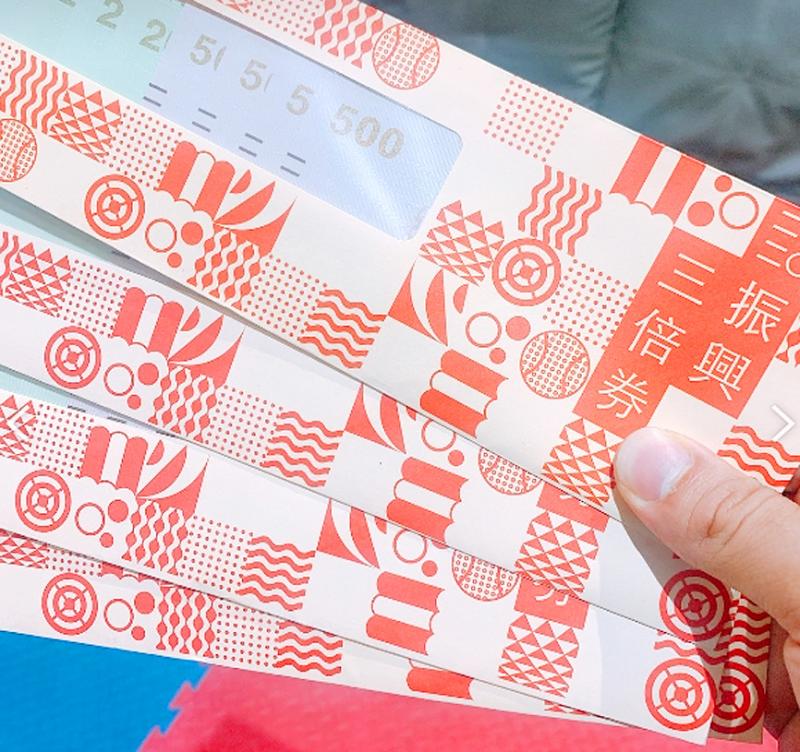The Executive Yuan yesterday signaled that it might do away with an upfront payment in its planned quintuple stimulus voucher program, as differentiating between who would qualify to have the NT$1,000 buy-in waived might cost too much to administer.
Last year’s Triple Stimulus Voucher program had a provision for groups, including low-income families, to receive the NT$3,000 in vouchers without paying the NT$1,000, Executive Yuan spokesperson Lo Ping-cheng (羅秉成) said, adding that similar measures are planned for this year’s program, with those who received COVID-19 pandemic relief funds to benefit.
If the government were to waive the fee for those who received relief funds as well as groups — such as farmers, fishers, taxi drivers, tour guides, self-employed individuals and uninsured workers — who received government subsidies, almost half of Taiwan would be eligible not to pay the buy-in, Lo said.

Photo: Hung Mei-hsiu, Taipei Times
Premier Su Tseng-chang (蘇貞昌) said that a situation in which half of the nation is paying to enter while the other half is not might create social conflict.
Moreover, determining who is eligible to have the fee waived becomes more complicated with each condition, leading to enormous administrative costs, Su said.
With the Directorate-General of Budget, Accounting and Statistics estimating that GDP growth this year might reach 5.88 percent, the government might be in a position to absorb the loss if the upfront payment of NT$1,000 is waived for the entire nation, Su said, adding that agencies have been asked to assess whether such a move is feasible.
The Executive Yuan announced the possible change after Democratic Progressive Party legislators over the past few days called for the government to waive the upfront payments.
Last year, an upfront payment of NT$1,000 was exchanged for NT$3,000 of vouchers.
The quintuple stimulus voucher program plan is for NT$5,000 of vouchers.
Additional reporting by CNA

A decision to describe a Chinese Ministry of Foreign Affairs statement on Singapore’s Taiwan policy as “erroneous” was made because the city-state has its own “one China policy” and has not followed Beijing’s “one China principle,” Deputy Minister of Foreign Affairs Tien Chung-kwang (田中光) said yesterday. It has been a longstanding practice for the People’s Republic of China (PRC) to speak on other countries’ behalf concerning Taiwan, Tien said. The latest example was a statement issued by the PRC after a meeting between Singaporean Prime Minister Lawrence Wong (黃循財) and Chinese President Xi Jinping (習近平) on the sidelines of the APEC summit

Taiwan’s passport ranked 34th in the world, with access to 141 visa-free destinations, according to the latest update to the Henley Passport Index released today. The index put together by Henley & Partners ranks 199 passports globally based on the number of destinations holders can access without a visa out of 227, and is updated monthly. The 141 visa-free destinations for Taiwanese passport holders are a slight decrease from last year, when holders had access to 145 destinations. Botswana and Columbia are among the countries that have recently ended visa-free status for Taiwanese after “bowing to pressure from the Chinese government,” the Ministry

‘SIGN OF DANGER’: Beijing has never directly named Taiwanese leaders before, so China is saying that its actions are aimed at the DPP, a foundation official said National Security Bureau (NSB) Director-General Tsai Ming-yen (蔡明彥) yesterday accused Beijing of spreading propaganda, saying that Chinese President Xi Jinping (習近平) had singled out President William Lai (賴清德) in his meeting with US President Joe Biden when talking about those whose “true nature” seek Taiwanese independence. The Biden-Xi meeting took place on the sidelines of the APEC summit in Peru on Saturday. “If the US cares about maintaining peace across the Taiwan Strait, it is crucial that it sees clearly the true nature of Lai and the ruling Democratic Progressive Party (DPP) in seeking Taiwanese independence, handles the Taiwan question with extra

HEALTHCARE: Following a 2022 Constitutional Court ruling, Taiwanese traveling overseas for six months would no longer be able to suspend their insurance Measures allowing people to suspend National Health Insurance (NHI) services if they plan to leave the country for six months would be abolished starting Dec. 23, NHIA Director-General Shih Chung-liang (石崇良) said yesterday. The decision followed the Constitutional Court’s ruling in 2022 that the regulation was unconstitutional and that it would invalidate the regulation automatically unless the NHIA amended it to conform with the Constitution. The agency would amend the regulations to remove the articles and sections that allow the suspension of NHI services, and also introduce provisional clauses for those who suspended their NHI services before Dec. 23, Shih said. According to